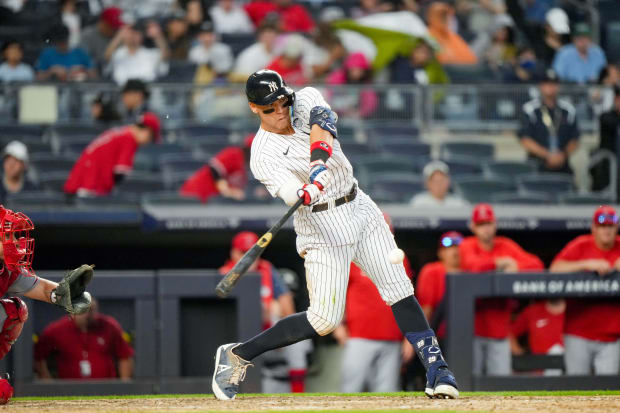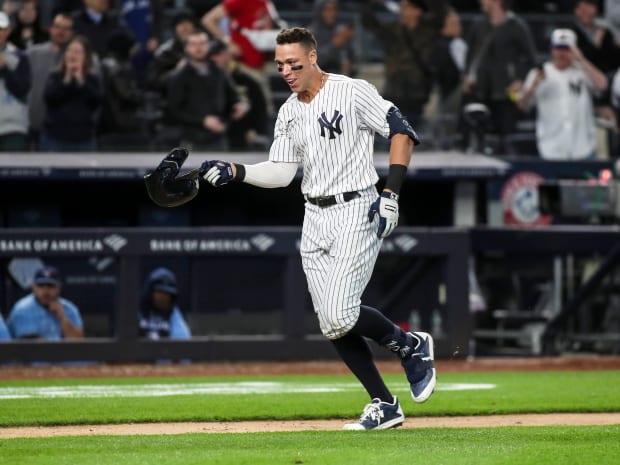One player cannot deliver a title. But ultimately that is how this contract will be judged.
Six-foot-seven Aaron Judge, from a rookie hitting .179 to the single season American League home run king, diligently built a ferociously efficient swing built on leverage. Judge loads on his back hip and destroys baseballs with such a precise uphill path of his bat that last season it produced a home run more than once every three times he hit a fly ball, a feat you might not see in some major league batting practices against coaches throwing 55 mph cookies.
Leverage—quiet, ruthless leverage—is also how Judge won his contract negotiations with the Yankees. New York checked its charts and algorithms back in April, waiting just before Judge’s self-imposed deadline, and figured its greatest homegrown slugger since Mickey Mantle was worth 13% less than what the Angels paid third baseman Anthony Rendon. They offered him $213.5 million over seven years, with concerns over his age and durability. They also misread their humble giant by announcing the details of the pile of money he turned down, a breach of private negotiations in Judge’s mind.

Erick W. Rasco/Sports Illustrated
Eight months later, the Yankees and Judge agreed on a contract of $360 million over nine years. It was the $146.5 million season—the most lucrative single season of baseball ever played. It wasn’t just because Judge hit 62 home runs. It was also because Judge played hard and often and kept quiet—except for letting the world know several times he didn’t like the Yankees talking in public about the money they offered him. He let it be known he might leave.
Negotiations would proceed on Judge’s terms. He held the franchise in his giant palm. The Yankees had no replacement. No recovery plan. Nobody else who sells tickets like Judge. No homegrown star, which is still the most valuable kind of star in the land of “True Yankees.” What awaited the Yankees in a world without Judge should have terrified them more than $40 million a year.
The Yankees had to sweat out a bona fide suitor in the Giants, who not only were desperate for a star of their own but also were Judge’s favorite and closest team as a child in Linden, Calif. The Giants wanted Judge so badly that during one of these final days of negotiations, a team source promised, “If they go eight [years], we go nine. If they go nine, we go 10.”
There was nobody like Judge on the market. The next best outfielder available was Brandon Nimmo, who in seven years hit one more home run than Judge hit last season alone. Every fly ball Judge hit last season brought fans out of their seats. Of his 153 fly balls, 57 were homers. (His other five home runs were classified as line drives). By September they were standing every time he just stepped into the box to hit. He gave the Yankees made-for-TV events on what were otherwise meaningless games. Their TV ratings skyrocketed for one reason: Judge chasing history.
The Yankees had no leverage. They had to keep throwing more money and years into the small fortune. Judge turns 31 next season. The Yankees will be paying him when he is 39 years old. There have been 411 major league players at least 6’6”. Only two of them have hit 10 home runs at age 37 or older: Dave Kingman and Dave Winfield. They were not as thickly muscled as Judge.
Judge weighs 282 pounds. There have been only 53 players listed at 270 pounds or more. There has been only one home run ever hit by someone that large at age 37 or older: by Bartolo Colon, most amusingly in 2016.
Judge is a baseball unicorn. The Yankees cannot feel good about what a baseball actuarial chart suggests about how someone this large will age because there is no good information. It doesn’t matter. Leverage is about reducing the rational and turning up the volume on the irrational. The Yankees had to buy the prime of his career, no matter the years it took to secure them.
Judge, Jacob deGrom, Trea Turner and Justin Verlander all agreed to contracts in this past week that pay them at least through age 39, following lengthy ones for Bryce Harper, Mookie Betts, Max Scherzer and others. It is the new cost of doing business: the money getting so big that clubs prefer to spread it out to minimize their luxury tax hit. And also, because it is the price of signing the player in a competitive market when star power means more than ever. Baseball still has more team loyalty from its fans than in other sports, which sell more personality and individual style. But baseball is not immune from the growing culture of celebrity in our society. Judge is a brand unto himself, the rare baseball player who is known by people who are not baseball fans.
Don’t believe the back end of this contract will haunt the Yankees. With inflation, the $40 million average annual value eight and nine years from now leaves a high-revenue team like New York with plenty of spending power. In the meantime, the Yankees can resume leveraging Judge. There will be more home run chases to sell tickets and more jerseys, milestones and Yankee tradition to sell, too. Nothing on the horizon—not Shohei Ohtani after next season or Juan Soto after the next—could match what Judge gives the Yankees in terms of homegrown star power.

Wendell Cruz/USA TODAY Sports
Judge got exactly what he wanted: the biggest free agent contract ever, the high average annual value (the first $40 million per year position player), the contract length, a chance to win every year (the Giants are not close) and, yes, the tradition of the pinstripes and the coziness of Yankee Stadium, where his batting average is 34 points higher than it is on the road and his slugging is 65 points higher. He can mishit a ball to right field and it can go out. If he wanted out of New York, the chance was there. The Giants had offered him the perfect out—just as the Rangers did for deGrom.
The contract, done on his terms, was a happy ending to what was The Year of Judge. Now the hard part begins for him. The Yankees will probably name him captain. With it will come more media responsibility. There are new expectations; he can hit 50 home runs next season and it will be a down year.
Most of all, the fans want him to deliver a World Series championship. Since the Yankees last won the World Series, the Giants (three times), Red Sox (twice), Astros (twice), Cardinals, Royals, Cubs, Nationals, Dodgers and Braves have all won the World Series. Judge was booed in the postseason last season at Yankee Stadium for not hitting. He is a career .211 hitter in the postseason. The Yankees are 21–23 in postseason games with Judge.
One player alone cannot deliver a title, not even the richest free agent in history. But ultimately that is how this contract will be judged: by the roster the Yankees build around Judge and, yes, by the luck that turns for or against a team in the unpredictable moments that define postseason history. Powerful as it was, the unprecedented leverage of Judge only goes so far.